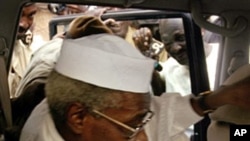Former Chadian president Hissène Habré wants West Africa's regional court to prevent Senegal from trying him for crimes against humanity. The court hears arguments in the case Friday in Abuja. Mr. Habré remains under house arrest in Dakar, Senegal.
In 2006, the African Union called on Senegal to try Hissène Habré in the name of Africa. Since then, Senegal has adopted laws that would allow it to do so, but the case is at a standstill as Senegal awaits international funding for the trial.
Habré's attorneys filed a complaint with the court of the Economic Community of West African States (ECOWAS) in 2008 to block his trial for crimes against humanity in Senegal, citing violations of his rights.
Habré's defense lawyers have expressed concern that he will not get a fair trial in Senegal and say Senegal's decision to amend its laws specifically targets Habré. In Dakar earlier this month, they denounced what they called the "manipulation" of victims by human rights organizations pushing for the trial.
Among their arguments before the ECOWAS court, Habré's attorneys say Senegal cannot prosecute him for crimes that have just been added to Senegalese code, but Human Rights Watch attorney Reed Brody disagrees.
"We know since Nuremberg and the Rwandan and Hague tribunals that that is not so, that under international law, international crimes - things like crimes against humanity, genocide, war crimes and torture - are considered to be crimes whether or not they've actually been written into law," said Brody.
Brody is legal counsel for Human Rights Watch in Belgium, which took Senegal to the International Court of Justice in 2009 for its failure to prosecute Habré.
He says Habré is accused of serious crimes, deserves a fair trial, and is not being unjustly targeted.
The former Chadian leader has been under house arrest in Senegal since 2000. He fled here after being deposed in 1990 and has since been accused of crimes against humanity and thousands of political killings and cases of torture during his eight years in power.
Senegal had said it wants all $38 million of the trial's proposed three-year budget up front. It includes money to bring witnesses to Dakar and a third of the budget to reconstruct a courthouse, which some in the international community have deemed excessive.
That proposed trial budget is currently being negotiated. A delegation from the European Union and the African Union visited Senegal this spring, and a new draft of the trial budget is expected at the end of this month and could be finalized later this summer.
Senegal's justice minister, who was replaced last Friday, El Hadj Amadou Lamine Sall, said Senegal remains committed to trying Habré.
Sall says it was the international community who asked, he says even begged, Senegal to judge Habré, and agreed to fund the trial. He says Senegal will put forth manpower and administrative resources but will not spend money it does not have on these proceedings. He says Senegal will not move forward until all funding has been secured.
Sall said Senegal has also requested the the European Union and the African Union put in place administrators to oversee the trial budget once it is agreed upon and paid out.
The ECOWAS court will hear arguments Friday in Abuja in Habré's complaint against Senegal. The court ruled in November of last year that victims may not take part in the proceedings, and ruled in May that it has jurisdiction to hear the case.
It is unclear what effect, if any, a decision in Habré's favor by the ECOWAS court could have on the trial in Senegal.
Senegal's former justice minister Sall says he does not think that today there is a way for Senegal to not try Hissène Habré. He says Senegal's internal judicial mandates, that are in agreement with its various international engagements as well as its own commitment, oblige Senegal to judge him and they will. If Habré wins the ECOWAS case, Sall says Senegal will then examine that decision and its potential consequences.
Those working on the case in Senegal say it could set a landmark legal precedent of African courts judging African rulers on African soil.
ECOWAS Court to Hear Arguments in Habré Complaint Against Senegal




